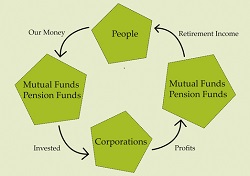|
People, Profits, & Pensions |
|
Who Profits from Apple Profits?
January 28, 2014
And, they matter to a lot of people who don't even know they're part of the markets: working people who have invested in Apple through their pension funds and mutual funds. Data from nasdaq.com indicates just over 60% of Apple's shares are owned by institutional investors, meaning mainly pension funds and mutual funds (including ETFs). In turn, many millions of working people, in both the public and private sectors, 'own' these funds. Among those owners are members of the State Board of Administration of Florida Retirement System (with 1.6 million Apple shares at the close of trading on September 30, 2013), and State of New Jersey Common Pension Fund A (1.35 million shares as of September 30, 2013). This quarter, which ended December 28, 2013, includes the all-important Christmas season. In announcing the results, the Apple news release sounded upbeat:
Many owners of Apple shares apparently disagreed, they were trading down more than 6% an hour after this morning's opening (and on a $500+ stock, that's a big number). Based on yesterday's closing price of $550.50, the $3.05 dividend represents an annual yield of 2.20%.
The Bigger Picture:Will Profits from Big Macs Add to Your Retirement Income?In 1948, the McDonald brothers redesigned and remodelled their drive-in restaurant in San Bernardino, California. Taking inspiration from Henry Ford's assembly-line, they created the fast food revolution, with the quick service and low prices we now take for granted. In that same year, the U.S. National Labor Relations Board ruled unions could include pension issues in contract negotiations. That ignited a massive expansion of pension plans. In the 1950s, pension funds started buying stocks, rather than just bonds or their equivalents; in addition mutual funds came of age. With these two developments working, middle class people became owners of big business. At first, their stakes were modest, but steadily growing. And in just a few decades, they gained controlling interests in many large corporations through their funds. Management guru Peter Drucker has called it, "...one of the most startling power shifts in economic history." Now, working people reap the benefits of those investments, collecting much of the profit distributed by McDonald's and other big corporations. Discover how the pieces fit together. In Big Macs & Our Pensions: Who Gets McDonald's Profits? - a new booklet -(about 25-pages), you will:
You may not be among the owners of McDonald's. But if you belong to any pension plan, or contribute to a mutual fund or whole life insurance policy, you likely own pieces of some big corporations. More importantly, though, your retirement income will be bigger and grow more dependably than you would otherwise expect. Big Macs & Our Pensions: Who Gets McDonald's Profits? is now available at Amazon.com
|

The Ownership Cycle
Copyright 2014. Robert F. Abbott, All Rights
Reserved.
|

 By: Robert F. Abbott, author of
By: Robert F. Abbott, author of  A big day for the markets yesterday, as Apple announced, after the close, earnings for the first
quarter of the 2014 fiscal year. Now that Apple has become the biggest dog in the corporate kennel, its
results matter to a lot of investors.
A big day for the markets yesterday, as Apple announced, after the close, earnings for the first
quarter of the 2014 fiscal year. Now that Apple has become the biggest dog in the corporate kennel, its
results matter to a lot of investors.